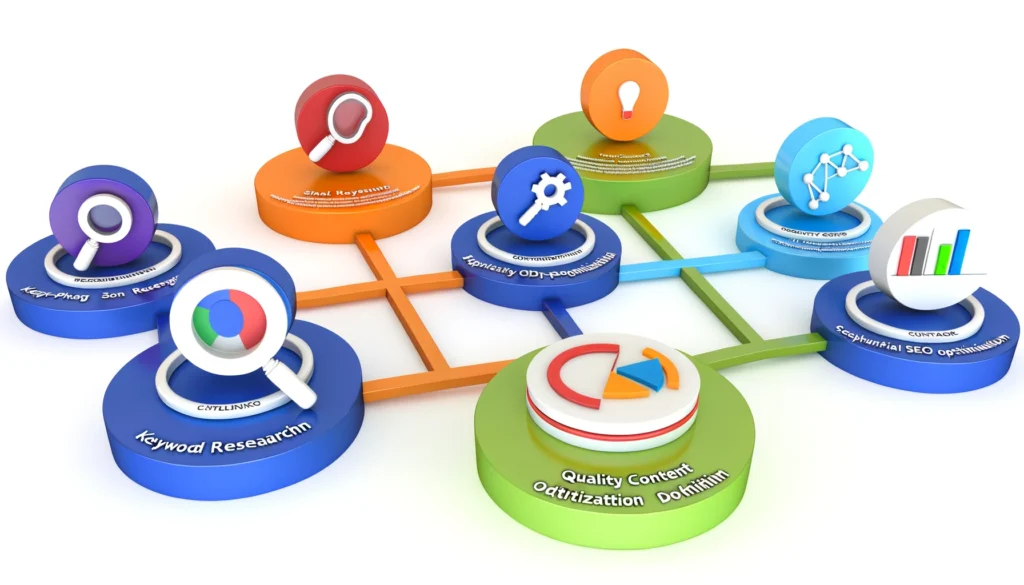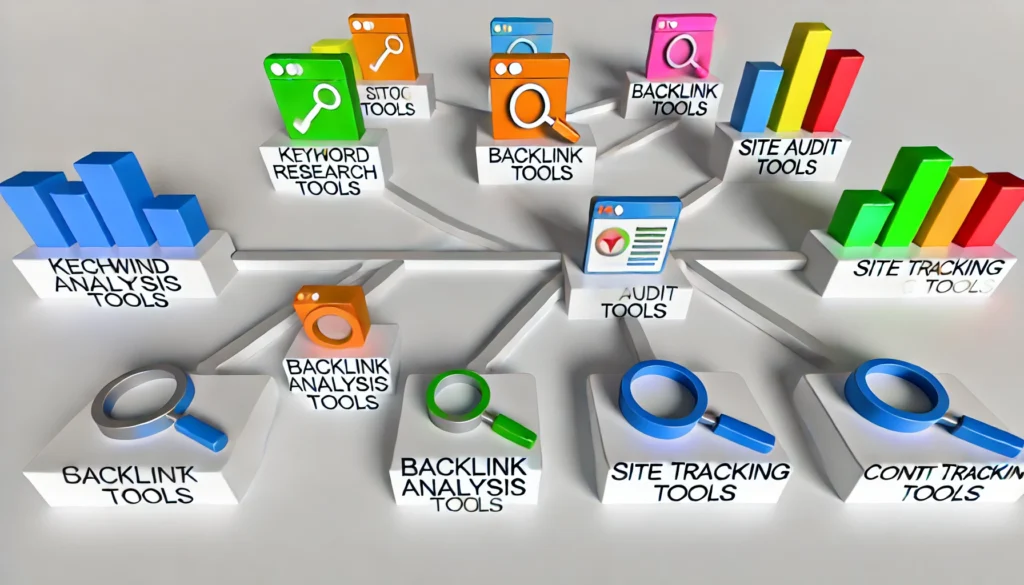Search Engine Optimization, often known as SEO, is a vital part of digital marketing. But what exactly is SEO, and how can you leverage it to rank on top of search engine results? In this article, we’ll break down the basics of SEO, share effective SEO optimization tactics, and provide tips on content optimization and SEO tools to help you achieve top rankings.
What is Search Engine Optimization?
SEO involves enhancing your website’s visibility and ranking on search engine results pages (SERPs). When done correctly, SEO can drive more organic (non-paid) traffic to your site, making it easier for potential customers to find you.
How Do Search Engines Work?
Search engines like Google use complex algorithms to crawl the web, index content, and rank pages based on relevance and authority. The goal of SEO is to align your website with these algorithms to improve your ranking.
Essential Search Engine Optimization Tactics

To rank higher on search engines, you need to focus on several key SEO optimization tactics. Here are some of the most important SEO optimization tactics:
Keyword Research
Keywords are the words and phrases that people type on the search engine search bar. Effective keyword research means finding keywords that are relevant to your business, have high search volumes, and face low competition. Tools like Google Keyword Planner, SEMrush, and Ahrefs can help you find the right keywords.
On-Page SEO
On-page SEO involves optimizing individual web pages to achieve higher rankings and attract more relevant traffic. Key elements include:
- Title Tags: Your title tag should be compelling and include your primary keyword.
- Meta Descriptions: This is your web page’s description that lets users know more about your page. It should be engaging and contain relevant keywords.
- Header Tags: Utilize H1, H2, and H3 tags to organize and structure your content effectively. Include keywords in these headers.
- Content Quality: Your content should be informative, engaging, and relevant to your audience. Use keywords naturally within your content, integrating them seamlessly without overloading your text.
Off-Page SEO
Off-page SEO entails actions performed outside of your website to influence your rankings on search engine results pages (SERPs). Key elements include:
- Backlinks: Links from other reputable websites to your site, known as backlinks, significantly boost your site’s authority in the eyes of search engines. The more high-quality backlinks you acquire, the more authoritative and trustworthy your site appears, improving your chances of ranking higher on search engine results pages.
- Social Signals: Shares, likes, and comments on social media can indirectly impact your SEO by increasing your content’s reach and visibility.
Technical SEO
Technical SEO involves optimizing your website’s backend structure to make it easier for search engines to crawl and index your site. Key elements include:
- Site Speed: A fast-loading site improves user experience and can boost your rankings.
- Mobile-Friendliness: Ensure your site is responsive and performs well on mobile devices.
- XML Sitemaps: Submit an XML sitemap to search engines to help them understand your site’s structure.
- Robots.txt: use this txt file to guide search engines on which pages to crawl and which page to not.
Content Optimization Tips

Content is king in the world of SEO. Here are some tips to optimize your content for better rankings:
Create High-Quality Content
Your content should add value to your audience’s need, it should be informative, and relevant to your audience. Aim to solve problems, answer questions, and provide insights that your target audience is looking for.
Use Keywords Naturally
Integrate your primary and secondary keywords naturally within your content. This approach ensures your content remains readable and engaging. Avoid keyword stuffing, as it can lead to penalties from search engines and negatively impact your rankings
Optimize Images
Images can enhance your content, but they need to be optimized. Use descriptive file names, include alt text with relevant keywords, and compress images to improve loading times.
Update Old Content
Regularly updating old content to keep it relevant and accurate is essential for maintaining and improving your search rankings
Use Internal Linking
Internal links help search engines understand the structure of your site and can improve the ranking of individual pages. Link to relevant content within your own site to guide users and search engines.
Essential SEO Tools

Several tools can help you implement and track your SEO efforts. Here are some must-have SEO tools:
Google Analytics
Google Analytics is a free tool that offers comprehensive insights into your website’s traffic and user behavior. It helps you understand how visitors find and interact with your site, providing valuable data on user demographics, session duration, pages per session, and more
Google Search Console
Google Search Console assists in monitoring, maintaining, and troubleshooting your site’s presence in Google Search results. It provides essential data on search queries, indexing status, and potential issues, helping you optimize your site’s performance
SEMrush
SEMrush is a comprehensive SEO tool that offers keyword research, site audits, backlink analysis, and more. It’s a great tool for identifying opportunities and tracking your SEO performance.
Ahrefs
Ahrefs is another powerful SEO tool that provides in-depth analysis of your website’s backlink profile, keyword rankings, and competitor analysis.
Yoast SEO
If you’re using WordPress, Yoast SEO is a popular plugin that helps you optimize your on-page SEO. It provides real-time suggestions for improving your content and metadata.
Common SEO Mistakes to Avoid

Even the best SEO strategies can be undermined by common mistakes. Here are some pitfalls to avoid:
Ignoring Mobile Optimization
With more users accessing the web via mobile devices, ignoring mobile optimization can hurt your rankings. Ensure your site is mobile-friendly.
Keyword Stuffing
Overloading your content with keywords, a practice known as keyword stuffing, can lead to penalties from search engines. Use keywords naturally and focus on providing value to your audience.
Neglecting Technical SEO
Technical issues like slow page speed, broken links, and poor site structure can negatively impact your rankings. Regularly check your site for technical issues.
Not Monitoring Your SEO Performance
Failing to track your SEO efforts means you won’t know what’s working and what’s not. Use SEO tools to monitor your performance and make data-driven decisions.
Conclusion
SEO is a vital part of any digital marketing strategy. By understanding the basics of search engine optimization and implementing effective SEO optimization tactics, you can improve your website’s visibility and rank higher in search engine results. Focus on content optimization, leverage essential SEO tools, and avoid common mistakes to achieve the best results. Remember, SEO is an ongoing process, so stay up-to-date with the latest trends and continuously refine your strategy for long-term success.






